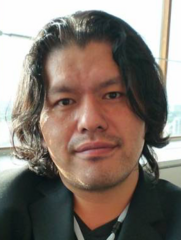Difference between revisions of "Kenji Eno"
From Sega Retro
m (Text replacement - "\| company=(.*), (.*) \| role" to "| employment={{Employment | company=$1 | notsega=yes }} {{Employment | company=$2 | notsega=yes }} | role") |
|||
| (2 intermediate revisions by one other user not shown) | |||
| Line 19: | Line 19: | ||
==Career== | ==Career== | ||
During his life, Eno founded the video game development companies [[wikipedia:EIM (video game developer)|EIM]] and [[Warp]], and also worked in a variety of other fields (such as the automotive, cellphone, tobacco, and hotel industries, among others.) | During his life, Eno founded the video game development companies [[wikipedia:EIM (video game developer)|EIM]] and [[Warp]], and also worked in a variety of other fields (such as the automotive, cellphone, tobacco, and hotel industries, among others.) | ||
| + | |||
| + | According to close friend Katsutoshi Eguchi, Eno also created both the name "[[Dreamcast]]" and the system's iconic spiral logo. [[Sega of Japan]] accepted open submissions from the general public on the new console's name, and posing as a regular entrant, Eno's submission beat around 1,000 other entries and won. Eno also suggested that the Dreamcast include a start-up sound (in the same way [[Windows 95]] famously started with a [[wikipedia:Brian Eno|Brian Eno]] jingle), to which he turned to [[Ryuichi Sakamoto]] - an offer the musician quickly accepted.<ref>JW Szczepaniak (2014). ''The Untold History of Japanese Game Developers: Volume 1''</ref> | ||
Eno died on February 20, 2013, due to heart failure brought on by hypertension.{{ref|https://web.archive.org/web/20131101015402/http://www.asahi.com/obituaries/update/0221/TKY201302210302.html}} | Eno died on February 20, 2013, due to heart failure brought on by hypertension.{{ref|https://web.archive.org/web/20131101015402/http://www.asahi.com/obituaries/update/0221/TKY201302210302.html}} | ||
| Line 24: | Line 26: | ||
==Production history== | ==Production history== | ||
{{ProductionHistory|{{PAGENAME}}}} | {{ProductionHistory|{{PAGENAME}}}} | ||
| + | |||
| + | ==Song credits== | ||
| + | {{mainArticle|{{PAGENAME}}/Song credits}} | ||
==Interviews== | ==Interviews== | ||
Latest revision as of 08:02, 10 December 2022

|
| Kenji Eno |
|---|
| Place of birth: Arakawa, Tokyo, Japan |
| Date of birth: 1970-05-05 |
| Date of death: 2013-02-20[1] (age 42) |
| Employment history: |
| Role(s): Executive, Designer, Composer, Musician |
This teeny-tiny article needs some work. You can help us by expanding it.
Kenji Eno (飯野賢治) was a Japanese musician and video game designer, and founder of game development company Warp. He gained a reputation as a maverick during the mid-1990s for creating unorthodox games like Real Sound: Kaze no Regret, and is perhaps most remembered today for his rebellious marketing techniques. Outside of Japan, he was best known for his survival horror series D, and for personally composing the soundtracks for several of his games.
Contents
Career
During his life, Eno founded the video game development companies EIM and Warp, and also worked in a variety of other fields (such as the automotive, cellphone, tobacco, and hotel industries, among others.)
According to close friend Katsutoshi Eguchi, Eno also created both the name "Dreamcast" and the system's iconic spiral logo. Sega of Japan accepted open submissions from the general public on the new console's name, and posing as a regular entrant, Eno's submission beat around 1,000 other entries and won. Eno also suggested that the Dreamcast include a start-up sound (in the same way Windows 95 famously started with a Brian Eno jingle), to which he turned to Ryuichi Sakamoto - an offer the musician quickly accepted.[3]
Eno died on February 20, 2013, due to heart failure brought on by hypertension.[1]
Production history
Games
- D (Saturn; 1995) — Directed and Written by[4]
- D (Saturn; 1995) — Original theme music by[4]
- Enemy Zero (Saturn; 1996) — Directed and Story by[5]
- Enemy Zero (Saturn; 1996) — Sound Producers[5]
- Enemy Zero (Saturn; 1996) — Additional Piano for Game Software by[5]
- Sega Rally 2 (Model 3; 1998) — Musicians
- Sega Rally 2 (Dreamcast; 1999) — Musicians
- D-2 (Dreamcast; 1999) — Directed and Story by
- D-2 (Dreamcast; 1999) — Music by
- D-2 (Dreamcast; 1999) — Programmed by
- D-2 (Dreamcast; 1999) — Musicians Are
- D-2 (Dreamcast; 1999) — Produced by
Music
- Sega Rally 2 (CD; 1998) — Sound Producer (All Music,Arrangement,S.E.& Voice)[6]
- D2 Original Sound Track (CD; 1999) — Producer
- D2 Original Sound Track (CD; 1999) — Manipulate
- D2 Original Sound Track (CD; 1999) — Programming
- D2 Original Sound Track (CD; 1999) — Vocalisation
- D2 Original Sound Track (CD; 1999) — Art Direction
- D2 Original Sound Track (CD; 1999) — All song are written&Arranged by
Song credits
- Main article: Kenji Eno/Song credits.
Interviews
No results
Photographs
- Main article: Photos of Kenji Eno
External links
- Official website (2003) (Japanese) (Wayback Machine)
- Kenji Eno at VGMdb
References
- ↑ Jump up to: 1.0 1.1 http://www.asahi.com/obituaries/update/0221/TKY201302210302.html (Wayback Machine: 2013-11-01 01:54)
- ↑ Jump up to: 2.0 2.1 http://gdri.smspower.org/wiki/index.php/EIM
- ↑ JW Szczepaniak (2014). The Untold History of Japanese Game Developers: Volume 1
- ↑ Jump up to: 4.0 4.1 File:D Saturn credits.pdf
- ↑ Jump up to: 5.0 5.1 5.2 File:Enemy Zero JP Saturn credits.pdf
- ↑ File:SegaRally2 CD JP Booklet.pdf, page 10